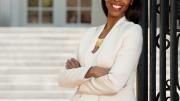Sarah Lewis ’01 remembers being approached by painter Jacob Lawrence while on a family visit to the Museum of Modern Art in New York. “I was very young—tiny—and I remember him breaking away from whatever storied crowd was around him, just to say hi to this African-American family in the museum.” Lewis’s parents weren’t artists themselves, but “They made sure I understood the importance of African-American culture.” Now assistant professor of history of art and architecture and African American studies, Lewis grew up with interests in painting, photography, and dance, thinking she’d continue them at the College. Instead, she was drawn to the social and political dimensions of the arts. Her clarity of thought on race in the arts has earned her public recognition rare for her field. In her course “Vision and Justice,” students look at daguerreotypes commissioned by Harvard naturalist Louis Agassiz, who attempted to prove different races were descended from different lineages. “The categories of race and citizenship are deeply tied to the category of aesthetics,” Lewis explains. “These were photographs that were instrumentalized for racial science.” While working on her Ph.D. at Yale, she came upon a previously unstudied speech by Frederick Douglass, who lived during the birth of both racial science and photography. Douglass anticipated the power of that new medium not just to dehumanize, but also to “read African Americans back into the human family,” Lewis argues with arresting precision, her self-possession mirroring Douglass’s own. This was why he became the most photographed American man of the nineteenth century: “Not the most photographed African-American man—the most photographed American man.”
Harvard Portrait: Sarah Lewis
Harvard Portrait: Sarah Lewis
An art historian on race and photography

Sarah Lewis
Photograph by Stu Rosner
You might also like
Eating for the Holidays, the Planet, and Your Heart
“Sustainable eating,” and healthy recipes you can prepare for the holidays.
Five Questions with Michèle Duguay
A Harvard scholar of music theory on how streaming services have changed the experience of music
Harvard Faculty Discuss Tenure Denials
New data show a shift in when, in the process, rejections occur
Most popular
Explore More From Current Issue

The Enterprise Research Campus in Allston Nears Completion
A hotel, restaurants, and other retail establishments are open or on the way.

What Bonobos Teach Us About Female Power and Cooperation
A Harvard scientist expands our understanding of our closest living relatives.






